Frequently Asked Questions
It’s good to have questions as it indicates how invested you are in your child’s education. Here is everything you need to know to understand us better.
- Highly congested classrooms: Every class has about 30-40 students. Will the teacher be able to pay attention to your child?
- Instructional Pedagogy: Classroom discussions are one-sided only; from the teacher to the blackboard, and then to the student. Sessions are not driven by discussions but by the pressure to complete the board’s curriculum in a limited time.
- Teacher quality varies based on location: Quality of teachers is dependent on the limited talent pool around the school/city
- Dependence on Tuition: Students go to a tuition class despite the school’s promise of providing a world-class education
- Exams that test memory only: instead of testing the natural creativity of the kids, traditional schools evaluate and rank students on their capacity of retaining information in their memory
- Natural Learning needs of children are unmet: Should kids of age 3-6 Yrs be taught in the same way as we teach kids of age 6-12 Yrs? Traditional schools follow the same methodology for both of these age groups
- Infrastructure that is of no or little use: How often has a school playground and the PT trainer produced Olympic-level athletes? The major component of the fees you pay goes into the maintenance of these facilities
- Additional expenses beyond school fees: Why are even popular schools not able to provide or slow in adopting new-age courses like programming, and robotics? Why do we as parents have to spend so much on this even after paying school fees?
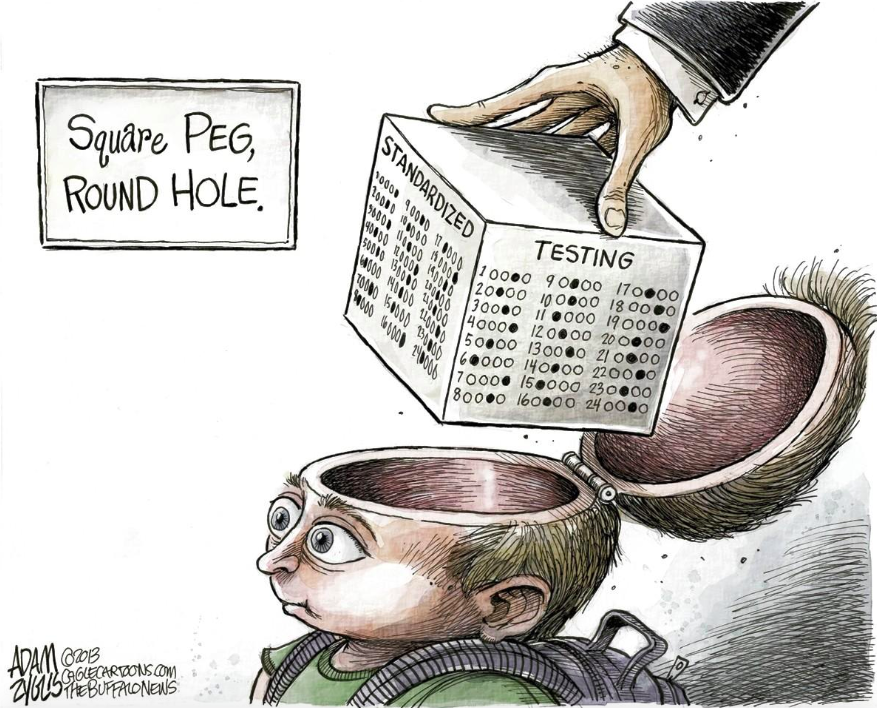
So, are we really educating our kids? Is this a natural way of learning?
- Provide the knowledge they need to be functional adults in their day-to-day lives
- Impart skills to exist and grow within that society as thoughtful citizens
- Develop learnability to excel in any life situation that might arise in future
- Get ready for Higher education to develop special skills and knowledge
As per Dr. Maria Montessori, about whom we will discuss in the next question, humans go through four learning planes as per age and each plane requires a different way of learning
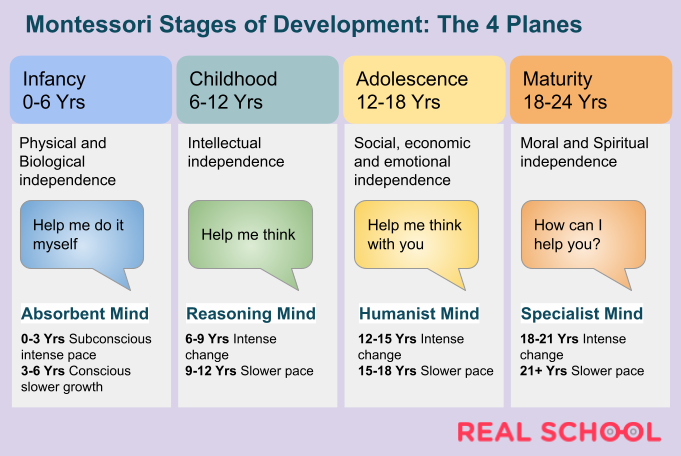
- Plane 1 - Infancy (Age 0-6), this pivotal plane focuses on a child’s ability to absorb new information and stimulation. When a child feels safe in his or her environment, they will learn and develop gross and fine motor skills, in addition to their unconscious and conscious mind. Imagine all that happens during a child’s first six years of life. From differentiating sounds, smells, and tastes to learn how to crawl, stand, walk, and speak, young minds are learning so much. While entering toddlerhood, they will develop hand-eye coordination, adjust to their culture, increase their vocabulary to several hundred words, and hone their cognitive development, among many other milestones Throughout the first plane of development, children will begin growing in independent play and task completion, practicing the mentality: “I can do this all by myself!” In tandem with independence comes your child’s individuality and personality distinction as they begin showing concrete personality traits and emotional patterns
- Plane 2 - Childhood (Age 6-12), With core cognitive milestones developed, the second plane of development encourages a child’s desire to know more and grow in their independence. As a result of their evolving conscience and working knowledge of right and wrong, a child’s mentality now includes: “I can decide and think for myself!”. Montessori programs for this age group will create activities that promote problem-solving, critical thinking, and cause-and-effect scenarios. Additionally, as they learn more about the world and environment, a child will begin to consider their place in this world, their identity and who they wish to become, and how they can help others in need.
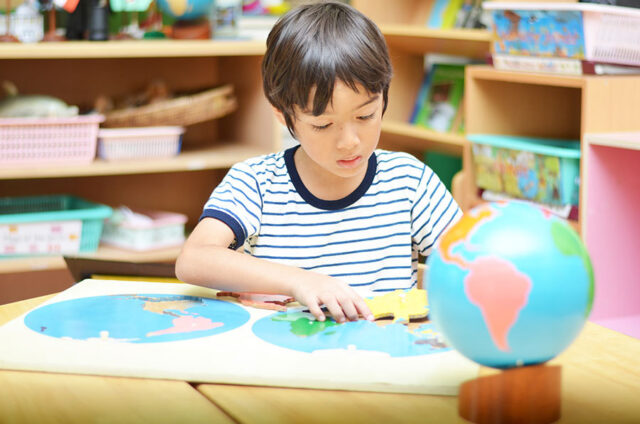
- Plane 3 -Adolescence (Ages 12–18) Adolescence is a pivotal period for everyone. As their emotional, physical, and social development reach new heights, this third plane of development bolsters reflective learning and application. With a growing knowledge of the world around them and the emotions within, adolescence encourages self-concern and self-assessment, resulting in the next mentality: “I can stand on my own!” As a result, adolescents will practice making more independent decisions, constructing a social life, and develop emotional independence.
- Plane 4 - Young adulthood and Maturity. The fourth and final plane of development occurs when a child transitions from adolescence to young adulthood, enhancing maturity as they transition into total independence. At this time, young adults will begin exploring who they are spiritually and emotionally, forming a more cognitive awareness of their identity. Additionally, this stage of development heavily demonstrates a strong desire for financial independence and decision-making. With new experiences
in working and earning an income, their mentality now transitions into: “I can get it myself!”

School | Grades and age | Pedagogy | Curriculum | Board |
Pre-Primary | 3 to 6 years | Sensorial, Material based | Montessori | NA |
Primary | Gd1 - Gd5 | Enquiry based Learning, Personalized, Project Based, Play Based | IGCSE and IB inspired | NA |
Middle | Gd6 - Gd8 | Enquiry based Learning, Activity based, Research, Project based | NCERT and IGCSE | NA |
Secondary | Gd9 - Gd10 | Enquiry based Learning, Lecturing, Research, Project based, Exam Preparation | Cambridge | IGSCE |
A - Level | Gd11 - Gd12 | Exam Preparation, Profiling, Comprehensive University admission focus | IB | IB |
- For Kindergarten to Garde8, look for Pedagogy. This is what will define if your child will be intelligent, independent and confident
- For grades 9th to 12th look for board. This what will define if your child will go for Indian colleges and competitive exams like or International education destinations like Germany, Australi, UK, US or Canada
- Curriculum is the least important factor
“A school with great pedagogy and no curriculum is better than a school with great curriculum and no pedagogy. But nothing like if a school follows an excellent curriculum and with great pedagogy”
“Realschool follows an excellent futuristic upgraded curriculum along with most powerful pedagogies researched and mastered by educators from around the world”
- Boards across the globe are NGOs or Private organizations which give external certification exams for Grade 10th and 12th
- The relevance of board is highest for its certification exam, because it decides the future college studies of students
- For example, IB, IGCSE, and Indian boards like CBSE, ICSE are recognized across the globe for college admissions.
- However, there is no compulsion for a school to be affiliated with a board. Like in US, there are no boards.
- In additiona to exams, boards provide two things
- 1) Curriculum, What to teach
- 2) Books, Official resources. For example CBSE official books are called NCERT
- 3) pedagogy, How to teach.
Parents are often confused about the difference between the 3. Here is a clear way to understand the importance of the 3 and how to use it chose schools
Board- Board is a certification body. Relevant ONLY for certification exams years grade 10th and 12th
- International board certifications like IGCSE O level or A level are more aligned towards taking university admissions
- Each board has released a list of subjects and books to follow. Since the purpose of the board is to conduct the exam, the syllabus prescribed by them is primarily focused towards preparing the child for the exam.
- 90% curriculum is same in all boards. However what differs is which topic is covered in which grade
- School can follow their own curriculum upto middle school as the board doesn’t conduct any exam in that age.
- For a good school, it is very important to have an updated curriculum as per the need of the real world and not be limited to the requirements of the board.
- RS upgrades existing curricula in-order to suit the needs of modern education and do what is best for its students.
- This is a common trait of all world-class schools, to the extend that some even publishing their own books.
- Pedagogy defines how learning happens in the classroom.
- This is the most critical aspect of a school’s quality of education
- A school which uses child centric, personalized and modern pedagogies can do wonders for the child
- International boards like IB and IGSE were introduced initially to help students of diplomats and frequently shifting families to continue their education uninterrupted.
- Over the years IB and IGSE have gained become popular because of their wide acceptance in Universities across the globe.
- Infact they have gained the reputation that students with high scores in IB or IGSE boards get preference in Study abroad programs over nationalized boards. However there is no statistical evidence that supports this idea
- Yes, Persons Edexcel is British IGCSE based private board which provides 10th and 12 th certification. It is owned by global education company Pearson.
- Notably, Pearson Edxl is a very reputed board with acceptance from all global universities
Boards | State board | CBSE | ICSE | IB | IGCSE | Common core |
Country of Origin | India | India | India | Geneva, Switzerland | Cambridge, UK | America |
Ownership | Government | Government | Private | Private | Private | Government |
Offered by schools in India | yes | yes | yes | yes | yes | Only 12th AP exam |
Learning expectations | memory and recall | memory and recall | memory and recall | Understanding, Knowledge and Application | Understanding, Knowledge and Application | Understanding, Knowledge and Application |
Evaluation Methods | Exams and tests | Exams and tests | Exams and tests | Continuous assessments, Projects, Essays, Research | Continuous assessments, Projects, Essays, Research | School dependent |
Academic Focus | Maths and Science | Maths and Science | English, Maths and Science | All subjects | All subjects | All subjects |
Relevance | Qualifying 12th % for IIT and NEET | Qualifying 12th % for IIT and NEET | Qualifying 12th % for IIT and NEET | Aligned with Foreign University admission | Aligned with Foreign University admission | Aligned with Foreign University admission |
Certification exams | 10th, 12 Boards | 10th, 12 Boards | 10th, 12 Boards | MYP and DP (Diploma) | O level and A level exams | AP level exams |
Has Private candidate exam center in India | Yes | Yes | Yes | No, Only through accredited schools | Yes | Yes |
Recommended class size | 35 | 35 | 35 | 12 | 12 | 12 |
Avergae class size | 45+ | 45+ | 45+ | 25 | 25 | 12 |
Fees | Very low | Low | Average | Very high | High | Very High |
- Traditional schools follow board based on the final examination body they want their students to appear for in 10th and 12th?
- Also it becomes easier for schools to recruit teachers and conduct academic operations if they get a set template
- Schools which have very large classrooms often prefer simple templates and rote learning boards because discussion less lecturing is the easiest method of teaching. Unfortunately lecturing is also the least effective method
- No, most repeated schools have their own content, research and development department.
- These schools often implement their own curriculum, books and pedagogies in Pre-primary, Primary and Middle school
- For 10th and 12th many reputed schools in India offer multiple options like IB and IGCSE
Here is a Logical framework which Parents can use to choose Board for their students
- Are you in Grades 1 to Grade 8?
- Board is irrelevant, no board conducts any exam at this stage. School’s curriculum and quality standards matter more.
- Give preference to quality of teachers, teaching pedagogy and small class size
- Chose Intenrational schools that offer better education and more advanced curriculum
- Nationalized curriculum like CBSE is too easy and basic in sciences. For math and social science they are too rote learning oriented in primary and middle schoo
- Are you in Grades 9 to 12 targeting top-ranked abroad Universities.
- UK, US, Australia, New-Zealand, Singapore all reputed University admission processes is more aligned to the approach of International boards
- Are you in Grade 9 to 12 targeting free study in Germany
- Study in Germany is free but it is also aligned to International boards
- It requires German language proficiency and Test AS
- Grade 9 to 12, scoring 85% plus and targeting strictly JEE and NEET
- If yes, you can chose CBSE board but you will need a coaching system for JEE, NEET or CUET
- Grade 9 to 12, targeting Indian universities with broad variety of careers like, design, law, commerce
- Again if your choices are beyon JEE and NEET a broad based exam like IGCSE will prepare you better with its choices of courses
- IGCSE is accepted in all Indian colleges and universities
- he best board to chose is IGCSE for Indian parents living abroad for the following reasons
- Transferability and continuity: No matter where you shift, IGCSE goes with you
- Certification exam available in all countries
- Highly aligned to foreign University admissions
- Why is affiliation needed
- Affiliation is needed only if a physical centre wants to get an 10th and 12th examination license for a school education board
- Is affiliation mandatory
- Affiliation for a school is not mandatory unless a school decides to provide a certification exam
- Can a school have multiple affiliations
- Yes a school can all , IB, IGCSE and CBSE affiliation.
Schools take affiliation because its helps them in the following manner
- When a school lacks the academic infrastructure like content teams, academic research teams, teacher training set ups, they need a hallmark to prove legitimacy to parents. Affiliation serves that purpose
- With lack of academic infrastructure, For a mass level school with many kids in class, giving results is very difficult. Thus they want a very structured rigid and mass management system.
That is why they go for Mass-management curriculum. Mass exams and put the onus of bad results on kids and ask for tuitions
- Gerry endearing
- Syllabus coverage vs education clash of interest (pass/fail)
- Example of this book, is not followed in any CBSE school
- All international boards dont do exams, want curriculum customization, project evaluation
- But due class size schools struggle to execute international boards also
- Less than 10% of affiliate school are true to the pedagogy. Most of them simply follow a book for theory but not in its true form
- CBSE 7th book on heat has 7 to 8 activities around heating metal rods, observing melting of wax and temperature measurement. Most this cannot be conducted in class. Thus they never happen at all. So student simply listens to theory in class, misses all the fundamental hands-on activities and moves on to answering exam questions.
- International curriculum is even more hands-on and project based and cannot be implemented for more than 12 kids in 1 class as recommended by the bodies. But not even 5% schools follow this treacher student ratio. So once again their affiliation numbers is more of a hall mark so that you dont ask this tought question
- Affiliate school with so many students will always focus on syllabus completion rather than student understanding.
- Offline Affiliate International schools have another problem, they are not able to find qualified teachers for the low salaries they pay.
- Thus most international schools, recruit CBSE teachers and ask them to follow a Cambridge book
“ The entire focus of an affiliate school is display affiliation to hide, lack of academic teams, lack of qualified teachers and lack of small classrooms”
Dr. Maria Montessori (1870-1952) was an Italian physician and anthropologist who devoted her life to understanding how children develop socially, intellectually, physically, and spiritually. By carefully observing children all over the world, she discovered universal patterns of development which are found in all children regardless of their culture or the era in which they live.
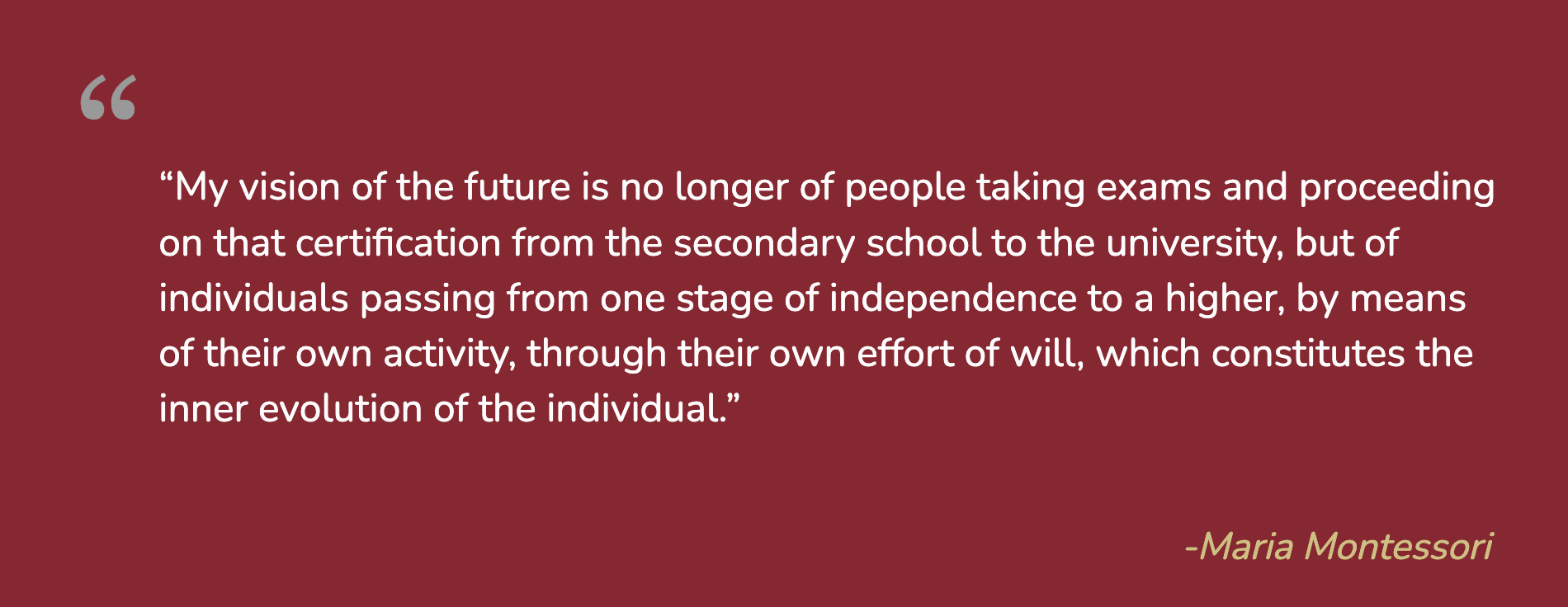
- Montessori is an educational approach that is based on the scientific foundation of the natural development of human beings – which is why it is a truly universal education with successful outcomes for all children. It acknowledges that children have an innate desire to learn, and what they require is an environment to enable that learning to take place
Montessori School | Traditional School |
Montessori educations focus on the overall development of the student | Traditional schools only focus on the curriculum at hand |
The students learn on their own in a Montessori school and follow personal interests | The students in a traditional school focus on the subjects that are the same for everyone and the knowledge about them is imparted by the teacher. |
The students are active participants in learning and acquiring knowledge | The students are passive learners and rely on the knowledge imparted by the teacher. |
Collaboration is encouraged among children and the teacher where motivation is brought about through self-development. | The teacher is in charge of all the learning process and motivation is gained through reward and punishment |
The students in a Montessori school are of mixed age-groups | The students in a Traditional school are of the same age groups |
The emphasis in Montessori learning is on social, intellectual, emotional as well as acquiring professional and academic skills | Traditional schools focus on intellectual as well as academic development |
Montessori education cultivates individual pace of learning where students are encouraged to learn at their own pace. | In traditional schools, all students are expected to adhere to the same pace of learning |
Discipline is encouraged to be self-developed in the Montessori model of education | In the traditional model of education. Discipline is enforced by the teacher. |
A sense of pride and self-esteem is what encourages students to love education. | In traditional modes of learning, motivation is believed to come from external sources and the students are expected to learn because it is a part of their curriculum |
- For primary school, we have made an International curriculum (sort of upgraded IB) to match up an small 1:5 classroom
- Yes, the content for Primary school is developed and 4 years of R&D. We can proudly say our curriculum and content is superior than any Internaitonal board from across the world
- A Graduating 5th grade student from Real School Primary will be ahead in his/her reasoning and knowledge compared to a 7th Grader from Indian boards and a 6th grader from IGCSE or IB boards
- For middle school, we have combined CBSE and IGCSE curriculum, taking the best from both
- Focus is to ensure that the Graduating 8th Grader finds the challenge of 10th board exam easy and stress free
- STEM in NCERT is too easy in in 6th to 8th, and becomes suddenly tough in 9th and 10th
- Humanities of NCERT is better than IGCSE for this age group
- We have thus created a combination ensuring our students have choice to choice their board for their 10th class
- Yes and No. For students we provide a basic revision books
- However for teaching, we use reference books. We always select the best books for the best topic
- People give too much importance to books (what to teach), for fast development what matters is (how you teach), that is where Real school education scores very high. He goes much beyond books and is truly understood through its multiple pedagogies.
The Pedagogical tools followed at Real School are
- Enquiry Driven Discussion: This pedagogical tool involves guiding students through questions and facilitating discussions to encourage critical thinking and inquiry. It focuses on student-led exploration and problem-solving rather than one sided lecturing
- Scientific Historytelling:
Combining science and storytelling, this method narrates scientific concepts through engaging stories. It helps students understand complex topics by placing them in historical or real-world contexts.
- DIY/Hands-on Activities:
Students engage in practical, hands-on activities to apply theoretical knowledge. This approach fosters a deeper understanding of concepts through active participation and experimentation.
- Virtual Tours:
Utilizing digital platforms, virtual tours allow students to explore places, museums, or historical sites online. This tool enhances experiential learning by providing immersive and visually rich experiences.
- Timelines:
Timelines visually represent chronological sequences of events. In an educational context, timelines help students understand historical context, evolution of ideas, or the order of significant occurrences.
- Simulation:
Simulations replicate real-world scenarios or processes to provide a dynamic learning experience. Students can experiment with various inputs and observe the outcomes, fostering a deeper understanding of complex concepts.
- Creative Explorations/Brainstorming:
Encouraging students to think creatively, this tool involves brainstorming sessions where students generate ideas, explore possibilities, and develop innovative solutions to problems.
- What If Discussions/Thought Experiments:
Students explore hypothetical scenarios or thought experiments to stimulate critical thinking. This method encourages speculation and analysis of potential outcomes in various situations.
- Student Lectures/Presentations:
Students take on the role of educators by delivering lectures or presentations on specific topics. This approach enhances their research, communication, and presentation skills.
- Project-Based Learning/Design Thinking:
Students work on extended projects that require research, problem-solving, and collaboration. Design thinking emphasizes a solution-oriented approach to real-world challenges.
- Expert Visits:
Bringing experts into the online classroom allows students to interact with professionals in a particular field. This provides valuable insights, industry knowledge, and networking opportunities.
- Real School is an online-only school. Your kid can take the sessions in the comfort and safety of your home
- The offices of RS are however present in Mumbai and Noida(Delhi).
- Once enrolled, our teacher conducts a brief evaluation of the student in an interactive session that helps us understand the suitable level to start the student’s journey
- At RS, a class has no more than 5 students. So that the teacher can pay individual attention and steer the class according to the need of every child
- The school is held for 200 active days in an year
- This does not include weekends, festivals, winter and summer holidays
School | Live class learning hours | Student activity hours | Project hours | Events and Guest lectures | Yearly student engagement hours |
Pre-primary | 400 | 50 | - | - | 450 |
Primary | 460 | 100 | 80 | 60 | 700 |
Middle | 500 | 150 | 150 | 60 | 860 |
School | Morning Batch (IST) | Afternoon Batch (IST) |
Pre-Primary | 9.30 to 11.30 | |
Primary | 9.30 to 12.30 | 2.30 to 5.30 |
Middle | 9.30 to 1.30 | 2.30 to 6.30 |
- Unlike watching YouTube videos, playing online games, or taking one-sided online lectures at a traditional school, the online Montessori sessions are only a medium of delivering instructions for the hands-on off-screen activities that are core to Montessori education.
- Students spend more time working on the educational kits and the screen is only to guide them
- Be it Montessori or traditional way of teaching, an online mode is inefficient if the teacher-to-student ratio is more than 1:8 as it is practically impossible to manage the class or interact and pay attention to every child
- However, even if the traditional schools take their class online with a small batch size of 1:5, the core methodology is still rote and abstract learning with no hands-on connection to the real world. Further, even if the teacher is able to pay attention to every child, the learning requirement is not met
- So, it primarily depends on which school and what pedagogy will work most efficiently in the online mode
-
And so, the inherent structure of RS makes it the best choice when selecting an online school because
- It provides flexible timing
- Students attend the sessions in the comfort of their home
- The hands-on methodology ensures minimum screen time unlike in those where learning can happen only when learners keep staring at the screen
- The camera setup and control by a teacher at RS puts the learner in a natural setting
- There’s no load of bags on their shoulder
- There’s no wastage of time in traveling
- There’s no unnecessary spending by parents on infrastructure that is hardly contributing
- to the education
- You are not limited to the local area talent pool for teachers
- Students from different cities, regions, social and cultural settings attend together giving it a truly global experience
- 100% coed without the nuances of it; as thought of in some culture
- Physical safety and security is at peak
- There is no fear of bullying common in offline schools which has long-term psychological damage
- What is the curriculum at the RS?
Language
Oral Preparation
Early language activities
Writing
Reading
Word Study
Grammar
Math
Counting
Decimals
Linear Counting
Addition
Multiplication
Subtraction
Division
Fractions
Passage to Abstraction
Sensorial
Visual Sense
Thermic Sense
Olfactory Sense
Gustatory Sense
Stereognostic Sense
Auditory Sense
Culture
Zoology & Botany
Physical Sciences
Geography
Art
Music & Movement
Practical Life
Fine Motor Skills
Self Care
Grace & Courtesy
Gross Motor Skills
Environmental Care
- Grade 1-5 (Primary)
-
Language development
Confident Communicators,
able to apply their reading, writing, speaking, and listening skills effectively
Readers,
engaging with a range of texts for information and for pleasure,
Writers,
using the written word clearly and creatively for a range of different purposes
Speakers and Listeners
who effectively present and collaborate, sharing and responding to ideas
Vocabulary
to express their unique ideas and thoughts in a clear manner.
Critical Reasoning
to evaluate and question why things happen the way they happen.
Persuasive Communication
to express their opinion and substantiate it with facts and reasons
Documentation
to keep a record of the knowledge and information gained.
-
Mathematical development
Numbers and Counting,
What are numbers? How to count them? How to use them? How do numbers work?
Arithmetical Operations
How to use numbers in the day-to-day world? How to estimate?
Spatial Sense and Geometry
How to navigate in the world around you? What are the shapes around? How to work with them to construct anything?
Data Handling
How to collect data, how to visualize it to understand patterns better? How to sort things into categories?
Probability
What are chance and likelihood? How does it affect decision-making?
Logical reasoning
Cause and effect, How to use deduction, How to do classifications?
Pattern recognition
How to find patterns to numbers and shapes and surroundings?
-
Focus thread
The Big Picture and Planet Earth ,
Where are we? What are things made up of? How did it all form? What's the Story of Earth? What all is there on Earth?
World of Living
What constitutes the living world? What is the Story of Life on Earth?
The Ecosystems
What are the ecosystems on Earth? What all goes on Earth? (Natural Phenomenon) What is beyond touch but is present? (Intangible Energies, Forces on Earth)
Methods of Knowing:
How do we know, what we know?
Human Body
How do we perceive the world around us? How does our body work?
Human Society
What is essential to survival? What is required to live well? How to go about life? (habits/ethics) How do societies function? How does our country work? How does the outer world work?
Computers - How work becomes easier with smart machines?Arts - How do we express ourselves?Money - How do we decide value of things around us?Engineering - How stuff works? How is it made?
-
Language development
- Real School Offers the following electives which parents can enroll in addition to the core school program
- Electives are priced and have to be paid separately when the electives are announced during the academic year
- Most electives are launched between between september to March
-
List of electives
- Math Logical Ability and IQ development
- Entrepreneurship
- oung Bureaucrat program
- Coding in Python
- Creative writing
- Foreign language
- Debating club
- Every grade requires certain materials to be procured for the “material based activities” in class and during project work
- Parents will be provided a monthly list of materials in advance.
- The cost of material will rarely go beyond 300 to 400 per month
- For Pre- Primary school, a specific Montessori educational kit is needed
- Pre-primary kit is charged separately form the fees and will be delivered to you before the academic year starts
- Price of kit Pre-primary kit is costs are 7000 for all levels
- We will also share the material list to parents, if they want to procure on their own
- Shipping is free for parents located in India
- For parents in an overseas location. The shipping cost will be charged as per actuals
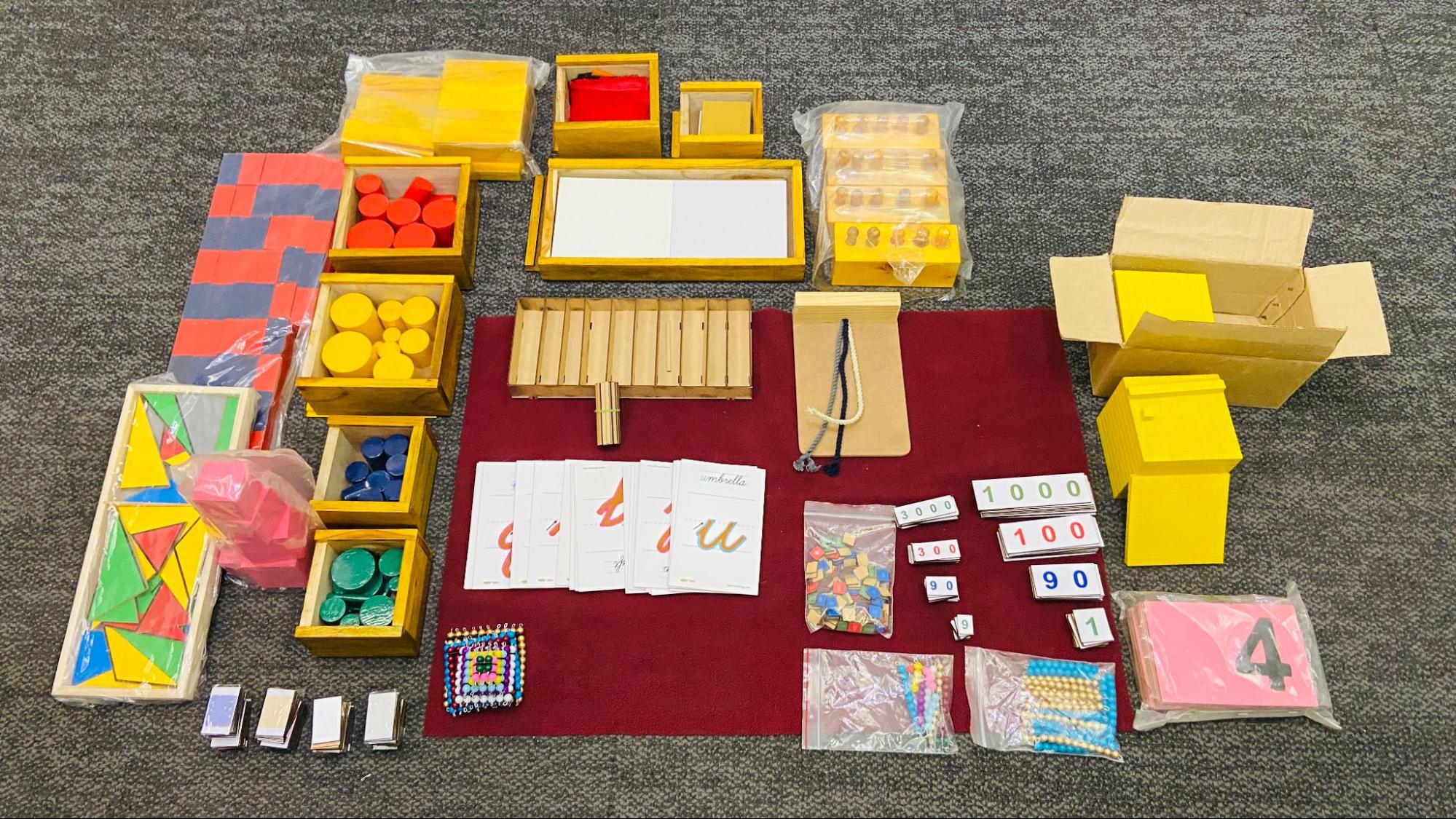
- Textbooks do not fit into this design because they can be limiting. When children are taught to rely on textbooks for answers, they will not know how to find information once you take that textbook away. For example, it is standard practice to have children fill out worksheets that follow the exact order of the information in the textbook. Often, the answers are even highlighted in bold text or italicized. This simply teaches children to copy what they see in front of them. It does not teach children how to find information for themselves. The Montessori approach uses hands-on lessons, movement, object manipulation, information-gathering, and many other ways to teach children how to think, process, and learn independently, a lesson that will serve them well for a lifetime.
- Another limitation with textbooks is that everyone in the class is expected to be on the same path and proceeding at the same rate. Maria Montessori knew that children learn at different paces and have different interests at any given time. Children experience many sensitive periods during their development. During a sensitive period, children are receptive to specific information and will have specific interests as a result. The Montessori approach taps into these sensitive periods and maximizes the child’s learning experience. Children are able to access the right information, at the right time in their development.
- Every student gets a student portal that contains day-wise instructions which the trainer will anyways be conducting in the class
- In a traditional school flow of the sessions is determined by the syllabus that is to be covered. If a student is absent, a considerable topic is missed by the student
- However, in Montessori schools, the emphasis is not on covering a syllabus topic to meet the teachers’ deadline, and so the same topic will be repeated in more than one way to help the child internalize it thoroughly
- In such rare cases, we can shift this student in another batch that is running at the child’s pace.
- In a traditional school, students have to memorize what they need to pass a test. Whereas, student evaluation at RS is quite different. To illustrate the difference, answer this; how many times have you crammed for an exam, passed it with a good grade, and then forgotten the whole concept soon afterwards? Most of us have memorized material to pass that class and move on. But how different would it have been if you had actually gained life-enriching knowledge for your time and efforts? And imagine this: what if you had actually enjoyed the learning process and wanted to learn more? This is the difference between a GPA-focused education and a Montessori education.
- In short, Montessori students learn more comprehensively, more joyfully, and more naturally through the Montessori method, and they do it without a bunch of textbooks, homework, or grades.
- Students in primary and middle schools evaluated through the following methods
- End of chapter consolidation presentation - The student presents a topic to the class and defends his/her findings and questions from the class
- Project work
- Daily Teacher observations
- Middle school students additionally have “open book, open time exams” and “timed tests”to evaluate their understanding.
- The final report is combination of all assessments method
- Students in primary and middle schools evaluated through the following methods
- End of chapter consolidation presentation - The student presents a topic to the class and defends his/her findings and questions from the class
- Project work
- Daily Teacher observations
- Middle school students additionally have “open book, open time exams” and “timed tests”to evaluate their understanding.
- The final report is combination of all assessments method
- Please refer to a few pages from the assessment sheet below:
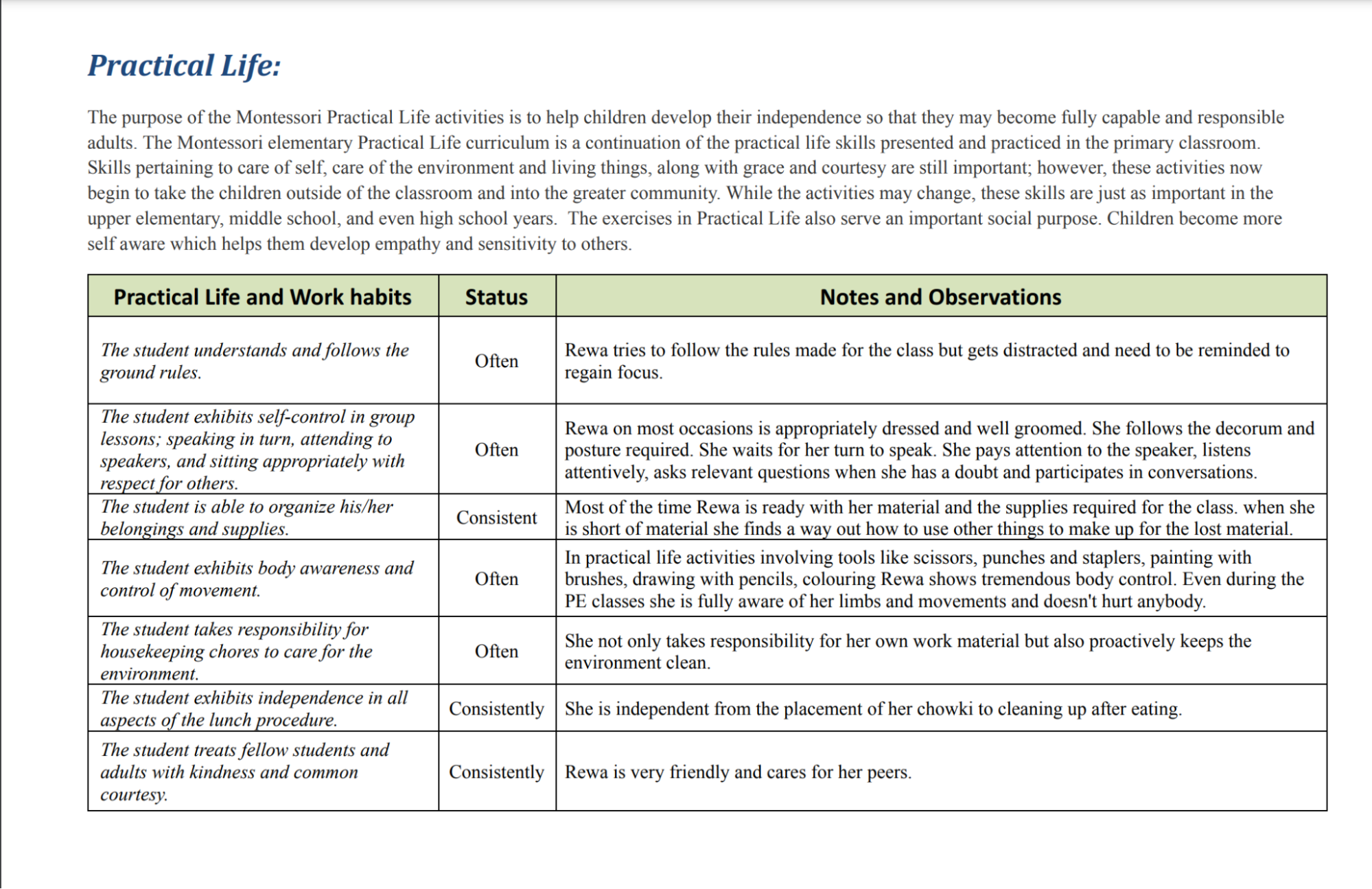
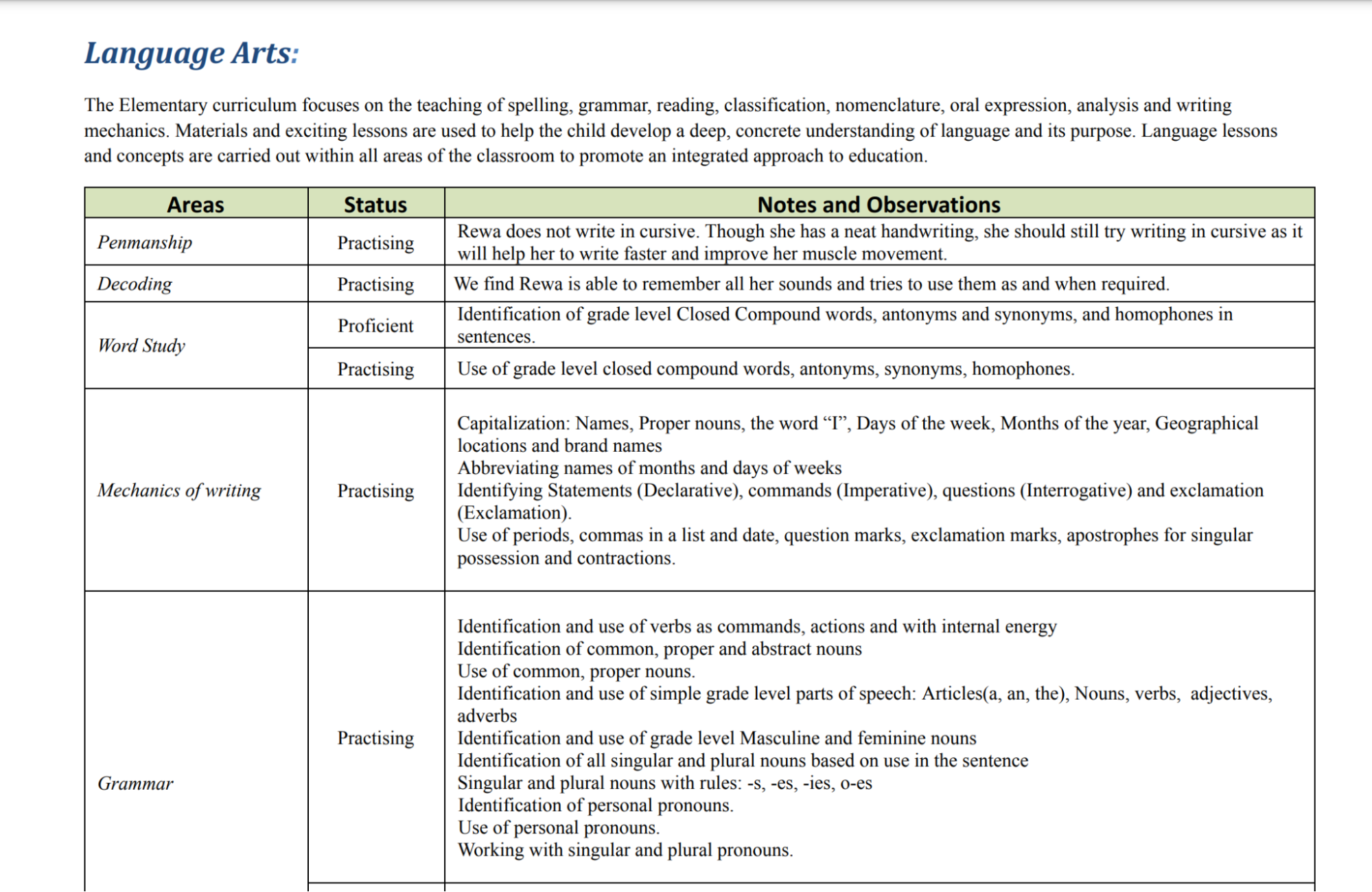
- Unlike traditional schools that are based on a fixed academic cycle, the academic year at the Real School is highly flexible as it does not depend strictly on the natural age of the child
- New batches start every month and they get booked 2-3 months in advance
- Current open Intakes include March 18th , June 24th and September 24th
- Yes, you may opt for getting into the waitlist of a batch that is full. However, you must have a confirmed seat too in any of the next available batches
- Speak to our educational counselor and get the list of upcoming batches
- An admission form will be shared with you. Fill in the necessary details and submit
- A single point of contact from the admissions team (your Student Manager) will be assigned to you
- This SM will call you for an orientation session and ensure your association throughout the academic calendar remains smooth.
- Payment of the registration fee only will not guarantee a seat in the proposed batch
- Admission in a batch will be confirmed only after paying the one-time Registration and Admission fee
Program | Age/ Grade | Registration fee | Admission Fee | Tuition fee | Total |
International Pre-Primary | Age 3 - 6 Years | 249 | 15,000 | 59751 | 75,000 |
International Elementary | Age 6-12 Years | 249 | 15,000 | 59751 | 75,000 |
- The balance fees can be paid in one of the following ways, 20 days before the class start date
- Full payment of the balance amount in one transaction by DD, Cheque, Credit/Debit card, NEFT, UPI, or Cash
- EMI setup using your Credit card, Monthly EMI, applicable int rate
- EMI setup using any other financial institution that you are associated with, for example, Bajaj Finance Card; @applicable int rate
- EMI setup using a third party lender at applicable int rate
- Fixed Monthly payments
-
- Armed Forces - At least one of the parents is in active service with the Indian Armed forces, Rs. 5,000
- Single girl child - If the student is a girl and the only child of her parents and there are no brothers or sisters, Rs. 5000
- Single Parent - If the child is being raised by a single parent, Rs. 8,000
- No surviving parent - If the child is being raised by a guardian as there are no surviving parents, Rs. 20,000
- Already a RealSchool of Montessori student for the previous 3 consecutive years, Rs. 10,000
- Siblings/Twins enrolling together - If two or more siblings of the same parent are enrolling at the same time, Rs. 3000 each
- Bulk enrollment - If five or more students, irrespective of their age, are enrolling together as a group, Rs. 8,000 each
- Please note that
- The approval is subject to verification of the submitted documents wherever necessary
- Only one of the criteria will be considered for freeship in the case when the enrolling student satisfies two or more criterias
- In case of false claims and/or documents, admission will be denied for the next 5 years
- Leaving certificate (LC) or Transfer Certificate (TC) will be issued by the Real School and the student can migrate to another school or board
- The school you are switching over to may conduct its entrance exam to check students’ level. Real School students are 1-2 years ahead of the kids of the same age studying in traditional schools
- Realschool students are academically and awareness wise, 1 to 2 years ahead of traditional school. Hence most of them find the switch rather easy
- Our students fairly understand the concept of “cause and consequence”. Hence even in a traditional school, our students will stand out as self-learners, sincere and confident students.
- Doing home work and studying for test for them is part of the values developed with us.
- In other words, you are not upgrading the student, but introducing them to a simpler and more rote way of learning that requires them to use half the skills learnt till the
- Montessori alumni are noted for being strong and capable persons. They model initiative, independence, dignity, selflessness, sound judgement, and ability to work well with others. From doctors to athletes, musicians, bakers, teachers, artists, politicians, entrepreneurs, clothing designers, and more, they are individuals whose education has helped them nourish their passions and hone their skills so that they may find their place in society.
- With millions of Montessori alums worldwide, it would be impossible to note the achievements of all. Below are some Montessori graduates you may know of because they are in the public eye.
Stephen Curry, NBA MPV (Golden State Warriors)

Jeff Bezos, Founder of Amazon
Larry page and Sergey Brin, Google Co-founders
Joshua Bell, Violinist, Conductor, Grammy Award Winner
Annie Frank, Diarist from the World War - II
- In 1968, George Land (with Beth Jarman) conducted a research study to test the creativity of 1,600 children ranging in ages from three-to-five years old who were enrolled in a Head Start program. This was the same creativity test he devised for NASA to help select innovative engineers and scientists. The assessment worked so well that he decided to try it on children. He re-tested the same children at 10 years of age, and again at 15 years of age (a longitudinal study)
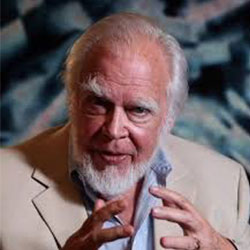
- The test was to look at a problem and come up with new, different, innovative ideas
- The results were astounding. The proportion of people who scored at the “Genius Level”, were:
- amongst 5-year-olds: 98%
- amongst 10 year-olds: 30%
- amongst 15-year-olds: 12%
- Same test given to 280,000 adults (average age of 31): 2%
- Refer for more info
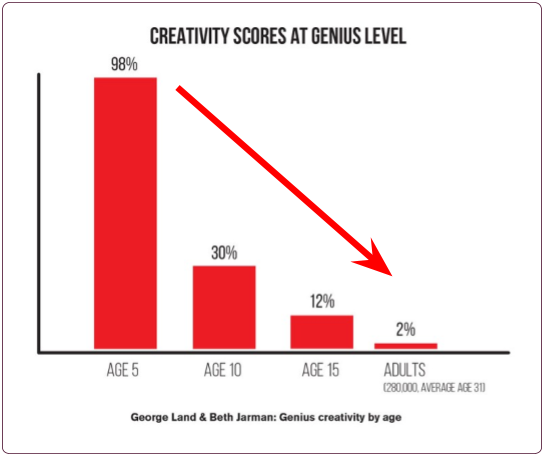
- The Program for International Student Assessment (PISA), an international assessment, says so. PISA measures 15-year-old students' reading, mathematics, and science literacy every 3 years.
- In the PISA test of 2009, India ranked 72nd out of 73 countries, outranking only Kyrgistan. Since then, India has strayed away from the test
- Initiated by the Organization for Economic Cooperation and Development (OECD), an intergovernmental economic organization with 36 member countries, the Programme for International Student Assessment (PISA) is a study done to produce comparable data on education policy and outcomes across countries.
- Unlike conventional tests and exams, the PISA test does not assess students on their memory, but attempts to evaluate whether students can apply the knowledge they have gained through primary and secondary education. Apart from subjects like math, reading comprehension and science, the test also includes innovative subjects such as collaborative problem-solving and financial literacy. Further, it evaluates whether students can solve mathematical problems or explain phenomena through scientific thinking or interpretation of text. The test is taken in the language of instruction that the students are familiar with.
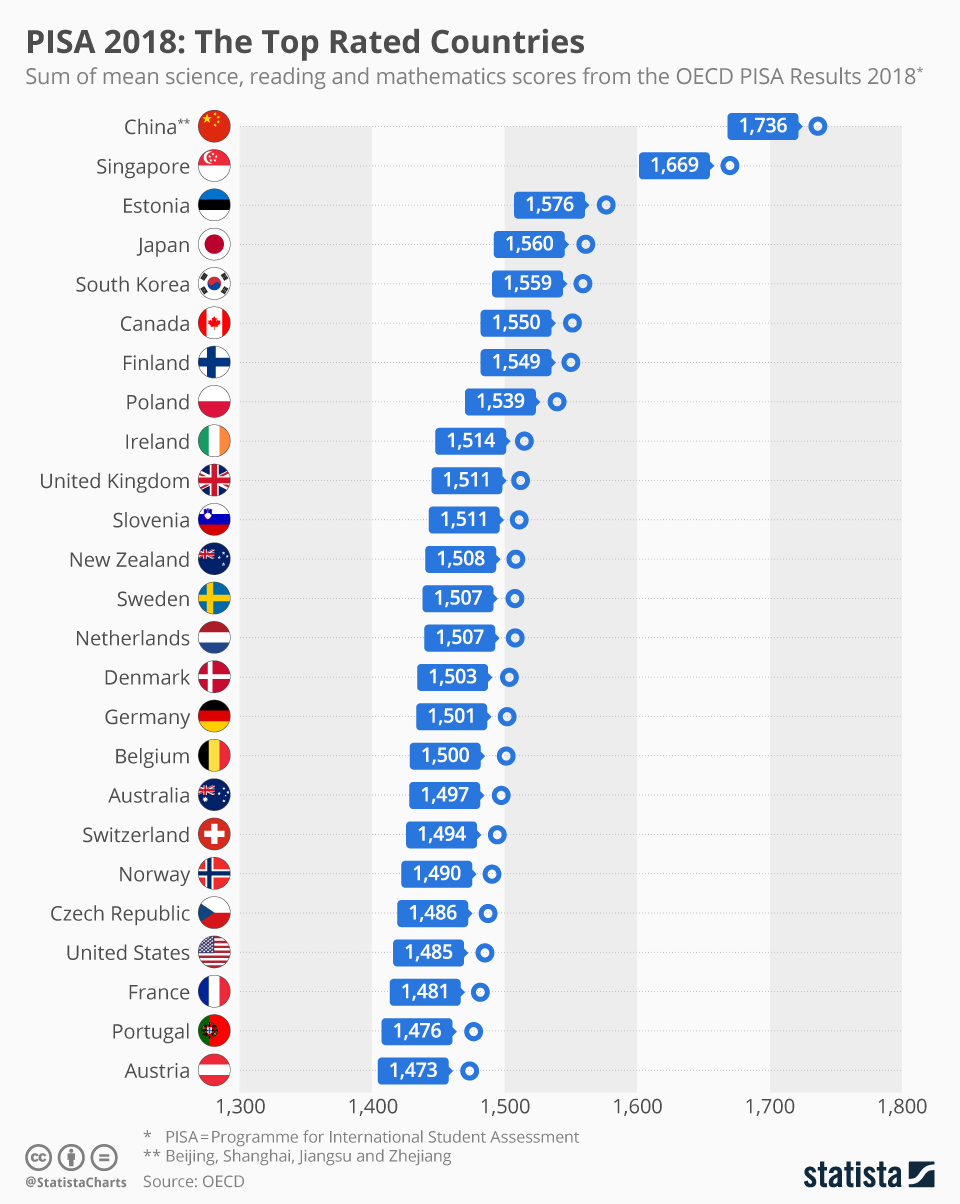
- Real School is an online-only school. Your kid can take the sessions in the comfort and safety of your home
- The offices of RS are however present in Mumbai, Noida, Kolkata, Hyderabad, and Bangalore
Once enrolled, our trainer conducts a brief evaluation of the student in an interactive session that helps us understand the suitable level to start the student’s journey
- Unlike in traditional schools where they are dependent on local talent for filling in the roles of teachers, RS hires talented tech-savvy teacher candidates from across India
- Our trainers hold a diploma in teaching the Montessori method in an online mode
- For ages 3-6, we conduct 2 hours per day, and 5 days a week
- For ages 6-12, there are 3 hours of classes, 5 days a week.
- Be it Montessori or traditional way of teaching, an online mode is inefficient if the teacher-to-student ratio is more than 1:8 as it is practically impossible to manage the class or interact and pay attention to every child
- However, even if the traditional schools take their class online with a small batch size of 1:5, the core methodology is still rote and abstract learning with no hands-on connection to the real world. Further, even if the teacher is able to pay attention to every child, the learning requirement is not met
- So, it primarily depends on which school and what pedagogy will work most efficiently in the online mode
- And so, the inherent structure of RS makes it the best choice when selecting an online school because
- It provides flexible timing
- Students attend the sessions in the comfort of their home
- The hands-on methodology ensures minimum screen time unlike in those where learning can happen only when learners keep staring at the screen
- The camera setup and control by a teacher at RS puts the learner in a natural setting
- There’s no load of bags on their shoulder
- There’s no wastage of time in traveling
- There’s no unnecessary spending by parents on infrastructure that is hardly contributing to the education
- You are not limited to the local area talent pool for teachers
- Students from different cities, regions, social and cultural settings attend together giving it a truly global experience
- 100% coed without the nuances of it; as thought of in some culture
- Physical safety and security is at peak
- There is no fear of bullying common in offline schools which has long-term psychological damage
Every student gets a student portal that contains day-wise instructions which the trainer will anyways be conducting in the class
- In a traditional school flow of the sessions is determined by the syllabus that is to be covered. If a student is absent, a considerable topic is missed bby the student
- However, in Montessori schools, the emphasis is not on covering a syllabus topic to meet the teachers’ deadline, and so the same topic will be repeated in more than one way to help the child internalize it thoroughly
In such rare cases, we can shift this student in another batch that is running at the child’s pace.
- Unlike traditional schools that are based on a fixed academic cycle, the academic year at the Real School is highly flexible as it does not depend strictly on the natural age of the child
- New batches start every month and they get booked 2-3 months in advance
